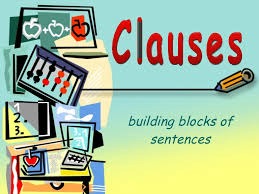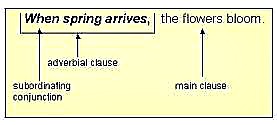 |
Learn English Locally, Apply It Worldwide! Enjoy Regular Practice |
Clauses
|
We have had a basic lesson about sentences before, however the notion of clauses can be confusing, both to beginners as well as to intermediate students of English. The easiest way of understanding clauses is to consider them as building blocks used to construct sentences. |
 |
Types of clauses
By definition, a clause is a group of words that contains a subject and a predicate (i.e. what is said about the subject).
I shall not complicate things by using abundant jargon, but you do need to understand that the clause is a grammatical unit that sits, in terms of its substance and importance, between a phrase and a sentence.
 |
Here we have a complex sentence, with a main clause and a subordinate clause - these being the building blocks. They are linked by the conjunction "when", making the subordinate part a 'time clause'. |
The main clause is an independent clause. The way to check whether your clauses are independent or not is this: if somebody would enter the room and only tell you that clause "The flowers bloom", you can understand its meaning, even if you feel the need of some more context.
However, with a dependent clause, the case is that if someone would tell you just that - in our example "When spring arrives" - you would look at that person as if s/he must give you more, otherwise you definitely don't know what they are on about.
Today's lesson is for us to understand and acknowledge this difference in 'authority' of one sentence over another and to observe that they are linked in a way or another in a complimentary way. In one of our future lessons we shall consider types of linking between sentences, but that needs to come after you realise the difference between the components as above.
In other future lessons, we shall look at the multitude of types of clauses, such as noun clauses, adjective clauses, adverb(ial) clauses,, comparative, complement clauses, relative clauses, 'that-'clauses etc.
For now, we need to accept that, whether short or long, sentences are the most important building blocks of writing prose, the foundation of written communication. As novelist Don DeLillo puts it across: “This is what I mean when I call myself a writer - I construct sentences.” We will soon look at the ways in which DeLillo and other accomplished writers construct their sentences.
English Corner Weekly E-zine
Packed with knowledge, published on Tuesdays.
Get yours here!
Our Archives:
Our lessons in the names and sounds of letters, short & long vowel sounds, CVCs, CCVCs, CVCCs, sight words, vowel and consonant contrasts, etc.
Our lessons will help increase your vocabulary, word recognition, find meaning in context, skills for TOEFL tests and other games, for fun.
Here we shall build some lessons to help you improve your writing skills.
Lots of lessons: cause & effect, comparisons, linking signals, relative clauses, presenting information, expressing emotions and grammar games, of course. We had more lessons on: intensifying adverbs and phrasal verbs, expressing various concepts such as addition, exception, restriction and ambiguity. Lately we started some exercises: likes/dislikes, frequency adverbs (twice), verb tenses, etc.
Learn how to build a website, by using the SBI! system - start from the basics, developing a site concept and a niche, supply and demand, learn about profitability and monetization, payment processing, register domain, website structure and content as a pyramid. Also learn about the tools I'm using to build this website. We also covered how to build traffic, working with search engines, building a good system of inbound links, using social marketing and blogs with the SBI system, how to use Socialize It and Form Build It, how to publish an e-zine and how to build a social network in your niche.
We looked at a few games by now: Countable & uncountable nouns, Free Rice, Name That Thing, Spell It, Spelloween, the Phrasal Verbs Game, Preposition Desert, The Sentence Game, Word Confusion, Word Wangling, Buzzing Bees, and The Verb Viper Game.
Be prepared to play and learn more pretty soon.
